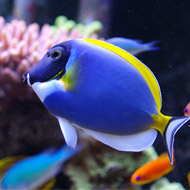
Animal charity publishes a fish care sheet
The RSPCA has published a fish care sheet to help owners provide a happy and healthy environment for their aquatic animals.
The care sheet forms part of the Big Fish campaign, which aims to reduce the amount of large fish being given up for adoption when they outgrow their tank.
The move comes as RSPCA inspectors brace themselves for “an influx of unwanted fish” following the release of Pixar’s Finding Dory in June.
The charity say that over the last five years they have collected almost 10,000 fish following calls from members of the public about their welfare.
Many of these calls were recieved in the wake of Finding Nemo, which peaked the public's interest in clown fish.
“Sadly many owners who buy exotic pets on impulse after seeing a film or TV show don’t find out how to care for the animals first,” said Alexandra Jones, RSPCA exotics scientific officer.
“When they then realise how much space and care the animal requires they can lose interest, or feel unable to care for them anymore. As a result exotic pets are often abandoned, given up to animal rescue centres or released into the wild.”
She continued: “Many people bought clown fish after the release of Finding Nemo in 2003 which led to a large number of fish being neglected or dumped when they grew too large or were more difficult to look after than expected. We are bracing ourselves for a similar trend once again.
“We want to help fish owners make sure they are providing a happy and healthy environment for their fish to thrive so have published these care sheets so everyone has easy access to important information.”
Goldfish are often a child’s first pet, but they are soon referred to as the ‘forgotten pet’ as many are neglected and cast aside.
A common misconception is that goldfish live for about five years and grow to 12 cm in length. But they have been known to live for 25 years and some can reach over 30cm.
“Fish can be challenging to keep. They can’t show their feelings as clearly as mammals do and meeting their complex biology environmental and behavioural needs takes a great deal of preparation, investment, time and care,” added Alexandra.
For more information about fish care and to download the care sheet visit www.rspca.org.uk/fish.



 The latest
The latest